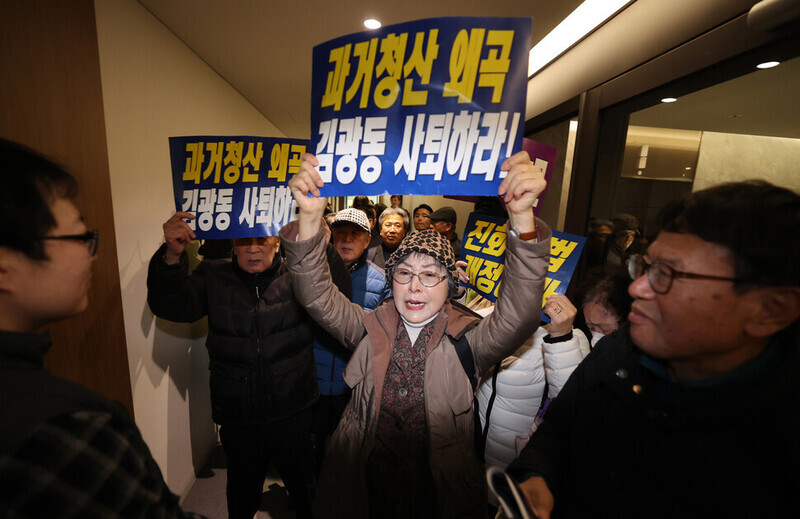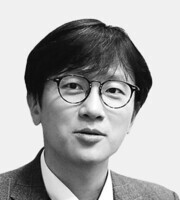hankyoreh
Links to other country sites 다른 나라 사이트 링크
[Column] Truth and Reconciliation Commission is new front of war on Korean history


By Lim Jae-sung, attorney and sociologist
The Yoon Suk-yeol administration’s push to remove the bust of independence fighter Hong Beom-do from the Korea Military Academy came as a surprise to many.
Hong was posthumously awarded the Order of Merit for National Foundation under the Park Chung-hee administration, and the Park Geun-hye administration named a Navy submarine after Hong. Then the Yoon administration came along and declared the presence of Hong to be unfit for the country’s national military academy, due to his ties with the Soviet Communist Party. Despite public polls indicating that 60% of Koreans opposed the bust’s removal, the Yoon administration insisted. Why? Even the Chosun Ilbo lamented the decision in an editorial.
“Now doesn’t seem like the time to be stirring up controversy with the bust of a nationally recognized independence fighter like Hong Beom-do,” the conservative paper wrote.
Yet the controversy didn’t come out of nowhere. It was merely a continuation of a war on history that the “new right” Yoon administration has been waging for some time. Park Min-shik, the country’s first-ever minister of Patriots and Veterans Affairs, commented on Paik Sun-yup in July of last year. Paik was an officer in the Gando Special Force, a battalion within the Manchukuo Imperial Army tasked with suppressing anti-Japanese militants during the Japanese occupation.
Park asserted that Paik was not “a pro-Japanese collaborator,” adding, “I’m willing to put my job on the line to defend that statement.” The praise for Paik came two months after Park’s appointment as veterans affairs minister — and was the only notable thing he’d done up to that point. Later that month, Park had the phrase “pro-Japanese collaborator” removed from the archives of Seoul National Cemetery regarding Paik’s remains.
The Yoon administration's war on history can be summarized as a holy war against “communist totalitarianism” — a phrase personally coined by the president. Anything that can be remotely linked to either communism or North Korea shall be purged from the pages of Korea’s history — whether it happened 50 years ago or 100 years ago. Conversely, anybody who opposed the communists — regardless of whether they were pro-Japanese collaborators or outright dictators — is to be praised. The administration’s push to build a memorial for Syngman Rhee in the middle of Seoul is based on its anachronistic holy war against communism.
The most horrific aspect of the war is yet to come. The Truth and Reconciliation Commission, established to investigate injustices that occurred throughout Korea’s modern history, will be the main battlefield of this war. As early as May, the administration may succeed in its efforts to have the commission decide that any historical figure who so much as lent a hand to anyone with communist affiliations deserved to be summarily executed. If that happens, it will be a decision by a public body utterly unprecedented in the history of Korea’s democracy. The administration’s ideological war is undoing the country’s achievements in human rights and democracy.
Here are the details of our current situation. Kim Kwang-dong, the chair of the Truth and Reconciliation Commission, is one of the Yoon administration’s ideological warriors. Since his appointment in 2022, Kim has consistently revealed his intentions to purge “traitors” from the country’s list of recognized victims of civilian massacres during the Korean War.
Near the end of last year, Kim told a bald-faced lie to the public when he claimed that the military and police may kill known communists and socialist sympathizers without trial during the Korean War, as it was impossible to hold proper trials during the war.
Kim’s ideological war became official on March 12. In October 1950, over 40 residents of the village of Uisin in Jindo County, South Jeolla Province, were executed by soldiers and police officers for treason, all without a trial. Last week, the commission’s general committee tabled an agenda item asserting that four of these victims were known traitors or communists, therefore making them ineligible for a TRC investigation.
Fortunately, the committee decided to postpone an official judgment on the matter at least until May. As a society, South Koreans must prevent the commission from denying these four a fact-finding investigation.
The evidence that the aforementioned four “communists” were indeed “traitors” is scant. In 1969, 19 years after the fact, Jindo County police — the perpetrators — drafted documents that simply identified them as “assassins” commissioned by North Korea. But for the sake of argument, let’s set aside the suspicious credibility of those documents. Even if they were criminals, the torture of criminal suspects while in custody is a clear violation of human rights. If human rights violations occurred, that alone is enough grounds for a retrial.
Even traitors deserve due process. Any massacre of civilians during the war — regardless of their guilt or innocence — is still a crime committed by the state. That is how things work in a civilized society, where the rule of law stands. That has been our historical stance for more than three decades. Yet here we are, in the midst of another ideological war on history, at a point where the state is declaring, “It’s okay to execute traitors without trial.” I thought this was 2024, not 1950.
“Even during times of war, if the police, as state actors, execute unarmed, non-resisting civilians without due process or any legal justification, that is a violation of the basic human rights guaranteed by our Constitution. It is also a violation of due process and the right to a fair trial.”
This passage is taken from a document drafted by the commission. Shouldn’t the commission live up to its mission?
“No matter the circumstance, state power should also be exercised in accordance with the law. There should be heavy consequences for any deviations.” These are the words stated during the memorial service of late President Roh Moo-hyun, on April 3, 2006.
Shouldn’t we do everything in our power to ensure the realization of this vision?
Please direct questions or comments to [english@hani.co.kr]

Editorial・opinion
![[Column] Season 2 of special prosecutor probe may be coming to Korea soon [Column] Season 2 of special prosecutor probe may be coming to Korea soon](https://flexible.img.hani.co.kr/flexible/normal/500/300/imgdb/original/2024/0426/3317141030699447.jpg) [Column] Season 2 of special prosecutor probe may be coming to Korea soon
[Column] Season 2 of special prosecutor probe may be coming to Korea soon![[Column] Park Geun-hye déjà vu in Yoon Suk-yeol [Column] Park Geun-hye déjà vu in Yoon Suk-yeol](https://flexible.img.hani.co.kr/flexible/normal/500/300/imgdb/original/2024/0424/651713945113788.jpg) [Column] Park Geun-hye déjà vu in Yoon Suk-yeol
[Column] Park Geun-hye déjà vu in Yoon Suk-yeol- [Editorial] New weight of N. Korea’s nuclear threats makes dialogue all the more urgent
- [Guest essay] The real reason Korea’s new right wants to dub Rhee a founding father
- [Column] ‘Choson’: Is it time we start referring to N. Korea in its own terms?
- [Editorial] Japan’s rewriting of history with Korea has gone too far
- [Column] The president’s questionable capacity for dialogue
- [Column] Are chaebol firms just pizza pies for families to divvy up as they please?
- [Column] Has Korea, too, crossed the Rubicon on China?
- [Correspondent’s column] In Japan’s alliance with US, echoes of its past alliances with UK
Most viewed articles
- 1‘We must say no’: Seoul defense chief on Korean, USFK involvement in hypothetical Taiwan crisis
- 2Is Japan about to snatch control of Line messenger from Korea’s Naver?
- 3Division commander ordered troops to enter raging flood waters before Marine died, survivor says
- 4[Editorial] Korea’s surprise Q1 growth requires objective assessment, not blind fanfare
- 5[Column] Season 2 of special prosecutor probe may be coming to Korea soon
- 6[Special report- Part III] Curses, verbal abuse, and impossible quotas
- 7Flying “new right” flag, Korea’s Yoon Suk-yeol charges toward ideological rule
- 8[Guest essay] The real reason Korea’s new right wants to dub Rhee a founding father
- 9[Column] ‘Choson’: Is it time we start referring to N. Korea in its own terms?
- 10[Column] Park Geun-hye déjà vu in Yoon Suk-yeol